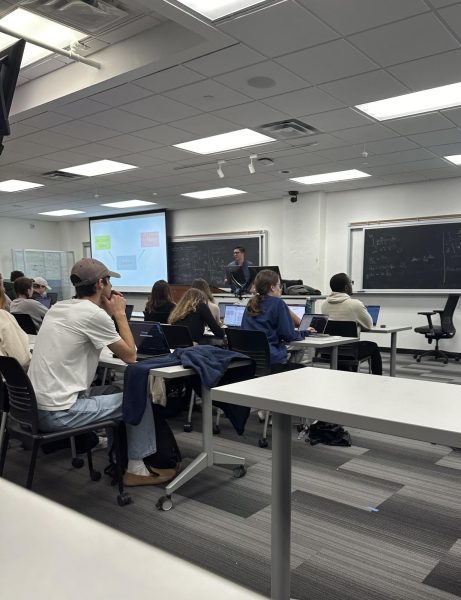
As spring semester class registration opens, students browse sites like RateMyProfessor.com to understand the curriculum of their prospective courses. Although two courses may share the same title, how instructors teach them may differ entirely.
Introductory Psych is one of those courses.
“I am given a good bit of leeway,” psychology professor Melinda Fabian said. “There are a large number of topics that can be included in an intro psych class, and I don’t have time to cover everything. I can choose what to cover.”
Fabian said she chooses what to discuss based on what she considers valuable and relevant for students.
“I like to cover topics that I believe can benefit students. For example, we have discussed academic achievement and variables that relate to being a successful student,” Fabian said. “There are minor life changes that students can implement on their own that could potentially directly benefit their mental and physical health. One thing that I mention often is — get enough sleep!”
Feedback from students is also crucial for Fabian to determine which topics and methods are effective in the classroom.
“I appreciate student feedback,” she said. “I have heard from students that the many real-life examples given in class are helpful in understanding the topics.”
Fabian also stressed the importance of the overall purpose of her course: to learn how to learn.
“I don’t want to simply give students facts to memorize. I think students should be aware of how researchers obtained the information that fills the textbook,” Fabian said. “I want them to understand the research process. I want them to learn HOW to learn.”
Some courses, like Career Development and Management, are more rigid in subject matter.
“It was very structured,” academic counselor Shira Hussain said, when she taught the class. “The PowerPoint presentations were already organized for [professors], and the syllabus laid out what we were going to teach and what assignments to give … It was laid out nicely for us.”
Even with less flexibility in her curriculums, Hussain said she uses her real-life experiences as an advisor in her classes and tries to relate to her students to liven the course. Hussain also said she could have taken more liberties in how she taught her courses.
“If [the professors] wanted to just really go wild and crazy, I think it would have been supported,” Hussain said. “We had bi-weekly check-ins with the Career Center. They were very open to whatever ideas.”
A national poll conducted in September found that Americans bipartisanly oppose government influence on education. Across the board, respondents believed that professors and students should influence what is taught in college classrooms, whereas only around a third of respondents said state and federal governments should.
State legislatures across the country have made deliberate efforts to limit the ability of educators to determine their own class content.
According to NPR, in 2021, 35 states have introduced a bill limiting what schools can teach “with regard to race, American history, politics, sexual orientation and gender identity.”
Louisiana republicans have also tried pushing legislation to ban “divisive concepts” in college classrooms, namely critical race theory, according to an article from the Louisiana Illuminator.
In 2021, Rep. Ray Garofalo introduced house bills which, if passed, would “make it illegal for schools to teach that people of any race or national origin are still affected by racism or oppression, among other topics.”
The Louisiana House Education Committee subsequently dismissed their bills in May 2022.
Mississippi, however, succeeded in passing legislation limiting the discussion of race.
In 2022, the Mississippi State Senate passed a bill which “prohibits schools from classifying students by race (with an exception for the required collection of demographic information). These prohibitions would apply to any courses of study as well as to the expenditure of state or local funds.”
Although the bill does not contain the term critical race theory, proponents describe the bill as an “effort to prevent the teaching of CRT at any Mississippi public school, including institutions of higher learning.”



Leave a Comment